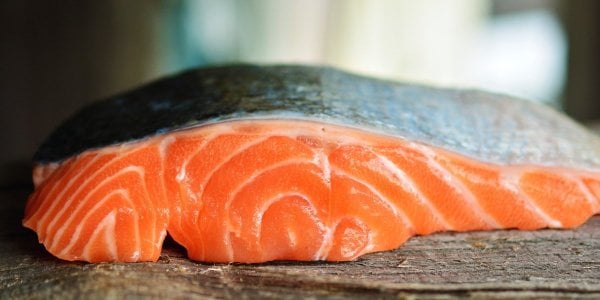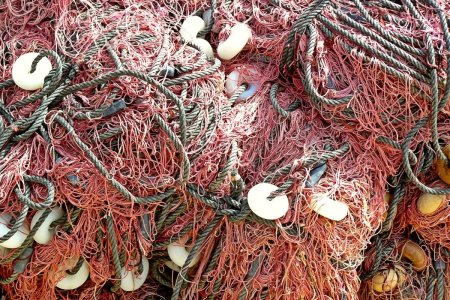Incredible innovation or scary science? First-ever lab-grown, 3D-printed SALMON hits supermarkets!
- Replies 67
Beyond the advancements in Artificial Intelligence (AI), has the world of culinary technology piqued your interest? Have you heard about the 3D-printed Nutella and peanut butter cheesecake slice?
Well, 3D food printing is currently revolutionising kitchens worldwide. And while you can't find 3D food products here in Australia just yet, you will be able to spot them in Austrian supermarkets soon.
Curious about what this could be? Keep reading…
Soon, shoppers in Austria will discover a unique fish option in their supermarkets's freezer, one that has never swum in water.
Revo Foods, the food tech start-up, has introduced the first-ever 3D-printed vegan food to Austrian supermarkets: a fungi-based fillet taking inspiration from salmon, named 'The Filet'.
This vegan salmon promises a rich content of protein, vitamins, and—like its aquatic counterpart—omega-3 fatty acids.
More than addressing global concerns about natural fisheries, producing 'The Fillet' will also use less energy and be more sustainable, despite its advanced production method, according to Vienna's Revo Foods.
According to the company, their 3D-printing technique uses between 77 to 86 per cent less carbon dioxide and conserves 95 per cent more freshwater than the traditional methods of obtaining wild-caught salmon, from ship to shore to shelf.
‘With the milestone of industrial-scale 3D food printing, we are entering a creative food revolution,’ declared Robin Simsa, CEO of Revo Foods, ‘an era where food is being crafted exactly according to the customer's needs.’
Salmon is frequently favoured by consumers due to its rich source of lean protein. Revo's vegan salmon, on the other hand, delivers an impressive 9.5 grams of protein per 100 grams.
While this falls short of the approximately 20 grams per 100 grams found in regular salmon, it remains a noteworthy protein content.
Revo Foods partnered with Mycorena, a Gothenburg-based biotechnology firm known for producing Promyc®, a fungi-based food protein in Sweden, to develop a mycoprotein from fungi suitable for 3D printing their salmon.
In recent years, there has been a surge in innovation related to 3D-printing various food items, ranging from laser-cooked cheesecake to lab-grown meat. These developments are driven by the belief that 3D-printed food has the potential to be environmentally sustainable.
Overfishing has persisted as a critical concern for over a decade, depleting 34 per cent of global fish stocks. Not to mention, destructive trawling practices inadvertently lead to the death of various marine species.
Climate scientists' estimates show that food production worldwide is responsible for almost a quarter of all carbon emissions. Out of this, livestock and fish farming contribute 31 per cent, with another 18 per cent arising from their processing and transport.
Revo Foods believes their success with ‘The Filet’ and other offerings will hinge on accurately ‘recreating an authentic taste that appeals to the flexitarian market.’
A flexitarian market includes consumers who follow a flexible diet, mixing plant-based foods with occasional meat and is the target audience for plant-based and meat-alternative products aiming to reduce meat intake while staying flexible.
However, the ultimate challenge will be persuading ‘pescatarians’ (seafood-only vegetarians) and 'flexitarians' to savour a manufactured fungus designed to taste just a tad fishy.

Members, what are your thoughts on the first-ever 3D-printed vegan salmon, 'The Filet,' hitting Austrian supermarkets? Would you be interested in trying it when it becomes available here? Share your thoughts in the comments below!
Well, 3D food printing is currently revolutionising kitchens worldwide. And while you can't find 3D food products here in Australia just yet, you will be able to spot them in Austrian supermarkets soon.
Curious about what this could be? Keep reading…
Soon, shoppers in Austria will discover a unique fish option in their supermarkets's freezer, one that has never swum in water.
Revo Foods, the food tech start-up, has introduced the first-ever 3D-printed vegan food to Austrian supermarkets: a fungi-based fillet taking inspiration from salmon, named 'The Filet'.
This vegan salmon promises a rich content of protein, vitamins, and—like its aquatic counterpart—omega-3 fatty acids.
More than addressing global concerns about natural fisheries, producing 'The Fillet' will also use less energy and be more sustainable, despite its advanced production method, according to Vienna's Revo Foods.
According to the company, their 3D-printing technique uses between 77 to 86 per cent less carbon dioxide and conserves 95 per cent more freshwater than the traditional methods of obtaining wild-caught salmon, from ship to shore to shelf.
‘With the milestone of industrial-scale 3D food printing, we are entering a creative food revolution,’ declared Robin Simsa, CEO of Revo Foods, ‘an era where food is being crafted exactly according to the customer's needs.’
Salmon is frequently favoured by consumers due to its rich source of lean protein. Revo's vegan salmon, on the other hand, delivers an impressive 9.5 grams of protein per 100 grams.
While this falls short of the approximately 20 grams per 100 grams found in regular salmon, it remains a noteworthy protein content.
Revo Foods partnered with Mycorena, a Gothenburg-based biotechnology firm known for producing Promyc®, a fungi-based food protein in Sweden, to develop a mycoprotein from fungi suitable for 3D printing their salmon.
In recent years, there has been a surge in innovation related to 3D-printing various food items, ranging from laser-cooked cheesecake to lab-grown meat. These developments are driven by the belief that 3D-printed food has the potential to be environmentally sustainable.
Overfishing has persisted as a critical concern for over a decade, depleting 34 per cent of global fish stocks. Not to mention, destructive trawling practices inadvertently lead to the death of various marine species.
Climate scientists' estimates show that food production worldwide is responsible for almost a quarter of all carbon emissions. Out of this, livestock and fish farming contribute 31 per cent, with another 18 per cent arising from their processing and transport.
Revo Foods believes their success with ‘The Filet’ and other offerings will hinge on accurately ‘recreating an authentic taste that appeals to the flexitarian market.’
A flexitarian market includes consumers who follow a flexible diet, mixing plant-based foods with occasional meat and is the target audience for plant-based and meat-alternative products aiming to reduce meat intake while staying flexible.
However, the ultimate challenge will be persuading ‘pescatarians’ (seafood-only vegetarians) and 'flexitarians' to savour a manufactured fungus designed to taste just a tad fishy.
Key Takeaways
- A food tech start-up called Revo Foods has delivered the first ever 3D-printed vegan food item to Austrian supermarkets, a fungi-based fillet 'inspired by salmon.'
- The product, named 'The Filet,' promises high protein, rich vitamin content, and omega-3 fatty acids, and is created using 77 to 86 per cent less carbon dioxide and 95 per cent less freshwater than traditional salmon production methods.
- Revo Foods partnered with Mycorena to create a mycoprotein from fungi that can be distributed and deposited through a 3D printer.
- The food tech team aims to craft both sustainable and flavourful food, targeting the flexitarian market to help mitigate overfishing's environmental impact.
Members, what are your thoughts on the first-ever 3D-printed vegan salmon, 'The Filet,' hitting Austrian supermarkets? Would you be interested in trying it when it becomes available here? Share your thoughts in the comments below!










